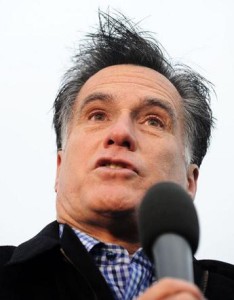 Steve Sipress
Head Rhino & Chief Strategist
Steve Sipress
Head Rhino & Chief Strategist
Election Results – What Entrepreneurs Can Learn

The results of yesterday’s Illinois Republican Presidential Primary Election are in, and the underwhelming choice was Mitt Romney.
Anyone who has been following the circus that is this year’s race to be the GOP’s nominee knows that even after all the months of bickering, infighting and posturing – including as many as 26 debates, depending on how you count them (an “insane” and “ridiculous” number, according to Fox News’ Chris Wallace) – and untold millions and millions of dollars spent on the various campaigns, there is still no clear-cut choice among the party’s faithful of which candidate they want to go up against the incumbent President in November.
Several different candidates have held the lead in the polls at different points (remember Herman Cain? Rick Perry? Michele Bachmann??), but the party remains decidedly undecided this late in the primary season.
This, even though most pundits and “experts” have dubbed Mitt Romney “the inevitable choice” – a fact that so far, the actual Republican voters have grudgingly failed to support.
Even the fact that his victory is seen as “inevitable” is not a very ringing endorsement of Romney’s popularity, is it? After all, the dictionary defines “inevitable” as “unable to be avoided, evaded, or escaped.”
Ouch. That makes “Republican Presidential Nominee Mitt Romney” sound like an impending natural disaster, something bad you wish wouldn’t happen – but you know that unfortunately it will.
Some campaign observers are quick to point out that Romney has failed to connect with his party’s conservative base, while others claim that he’s failed to connect with regular, working-class Americans.
No matter how you slice it, the fact is that Romney is failing to connect with voters in a meaningful way.
And that means that he is becoming his party’s presidential nominee somewhat “by default.”
So, what does all of this have to do with entrepreneurs?
It’s a very important lesson that all of us should pay attention to.
If we don’t do everything we can to establish ourselves and our company’s products or services as The Obvious Choice in our marketplace, then we are making a huge mistake.
We must take the time and effort to craft our own Unique Selling Proposition (“USP”) – what BusinessDictionary.com defines as the “real or perceived benefit of a good or service that differentiates it from the competing brands and gives its buyer a logical reason to prefer it over other brands. USP is often a critical component of a promotional theme around which an advertising campaign is built.”
Your USP must answer the trademarked question of small business marketing expert Dan Kennedy that your prospects are asking: “Why should I do business with you, versus any and every other option available to me?”
If you don’t clearly and emphatically answer this all-important question, thereby defining yourself and the chief benefit you and your company provide, then you run the risk of having your competition define you, as Newt Gingrich has for Mitt Romney, calling him “The Massachusetts Moderate.” That identity seems to be sticking with Romney much more than his self-definition as “The party’s best option to defeat the incumbent President,” – a vague, not-exactly-motivating description.
Another dangerous result of your failure to craft a compelling USP is that you will be seen as a commodity – “just another ___________” in your marketplace, virtually interchangeable with all the other myriad of choices consumers have when looking for a provider of your product or service. In other words, you’ll be leaving your success very much up to chance, hoping one of your competitors doesn’t craft a compelling USP and make him- or herself The Obvious Choice to your prospects.
That’s often a situation where the person with the most money to throw into a wide range of ineffective-but-for-the-sheer-weight-of-it advertising, marketing and publicity wins. Unfortunately, this is actually most often how marketing works, and how the vast majority of buying decisions are made: lesser-quality options with big advertising budgets often trounce their higher-quality competition in terms of revenue and profits.
For example…
- Does McDonalds’s serve the highest-quality food of any restaurant?
- Is Kim Kardashian the world’s most talented celebrity?
- Is Britney Spears the finest singer?
- Does the latest big-budget, special-effects-filled, box office blockbuster always win the “Best Picture” Oscar?
How about you and your business? Are you making every effort you can to carve out your unique place in your market – to make yourself and your product or service THE one-and-only, obvious, clear choice for the prospects you want to attract?
Or are you just hoping that – like Mitt Romney, or the plumber with the biggest yellow pages ad – you’ll simply be able to spend enough money on marketing to outlast your competition, leaving them frustrated and having them reluctantly choose you basically because when it comes right down to it, they just don’t know of any truly motivating, compelling choice?
Because, like it or not, your prospects are “voting” with their wallets all the time – not just once every four years.

4 Responses to Election Results – What Entrepreneurs Can Learn